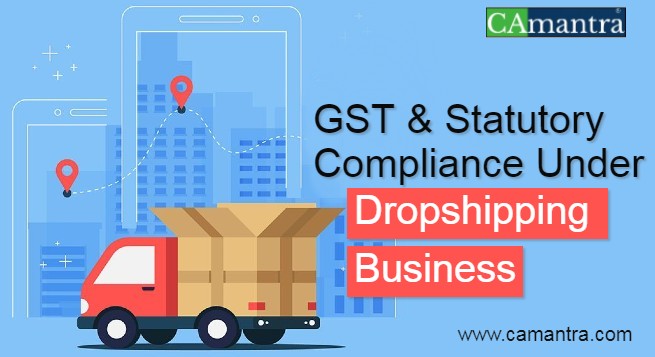Dropshipping is a business in which the seller sells the goods which he/she does not own at time of selling goods but then passes the order to a third party after receiving order then third party delivers the order to the purchaser.
The dropshipping business is increasing at a rapid rate. Since the person does not purchase the goods in advance, there is no investment and no risk of dead stock. He /she can focus on just selling & marketing.
The distinction between dropshipping and a standard retail business is that in the dropshipping business, there is no need to keep the stock of inventory instead of this the merchant purchases inventory directly from the3rd party and sells it directly to the customer to complete the orders.
In the 21st century, the world has guided the era of globalization and transformed all industries via an e-commerce platform. High Drop Shipments is one term which is often used these days in the e-commerce trade. In the GST regime, Dropshipping is the term that is very relevant and it is worth knowing about the importance of the Dropshipping concept in GST rules in India.
What are the Legal Compliances Under Dropshipping Business?
- Formation of Proprietary/Partnership Concern or Company.
- Entering of contract with Supplier/Manufacturer.
- GST and Customs Compliances.
In this we will take a look on GST and Customs requirements in dropshipping business.
How Applicability of Goods and Service Tax (GST) in Dropshipping is Taking Place?
Under this business model following are the types of seller that is one who makes sales outside India or Making sales in India or both.
i) Sales is made Outside India:
In case of Sales according to the IGST Act -Section 7 : If the supplier is located in India and destination is outside India, then the supply of Goods shall be considered as Interstate supply. So in this kind of case IGST is applicable.
In case of Export sales: Since the price on the website of seller will the final receivable amount and should be inclusive of all taxes the GST compliance becomes mandatory to determine sales price. Export can be made either by paying under Letter of Undertaking (LUT) or by paying IGST and claiming refund later on.
In case of purchase from supplier: Under this case, Since the goods does not entered the customs border of India as the goods will be directly send to final buyer the same is not considered as Import of Goods and the same will not be liable to GST or Custom duty.
ii) Sales is made in India:
In case of Sales with in India: The place of supply shall be with in India and accordingly IGST or SGST+CGST shall be levied. In this case determination of the Place of recipient is essential as the applicable GST will be determined accordingly.
In case of purchase from supplier: Under this case, since the goods enter the custom border of India the same shall be treated as Import and both Customs Duty and GST under reverse charge basis are applicable. The tax credit of GST paid for Import shall be available to the supplier.
Under this case the website owner is liable for collecting GST and paying the same both. Determination of Tax Inclusive Sales Price is mandatory as the sales price shall include both Import Duty and GST paid.
What is the Need of Import and Export Code (IEC)?
Because the goods are exported in first case or imported in second, it becomes mandatory to have an IEC code.
Having Contract With Seller.
If you want to excel in this business model it becomes essential to have a proper contract and to sale the product in your brand name. It will be ensured that the sales are made under your brand name & there are no direct contact details of seller in the product.
Your contract terms shall clearly indicate and reflect the delivery terms, payment terms, tenor of contract and any other ancillary charges. If possible the seller needs to ask for sample if the item is low price item or to take a visit to the supplier’s factory before entering in to contract.

